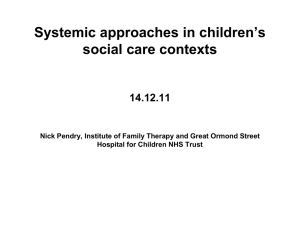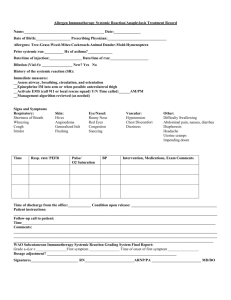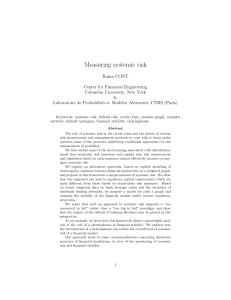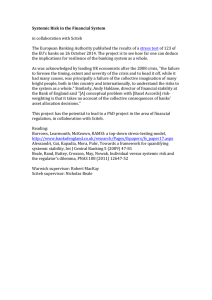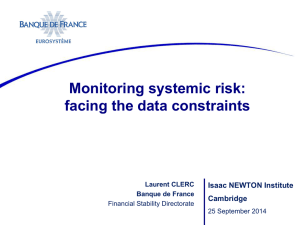BASIC SYSTEMIC COMPETENCES
advertisement
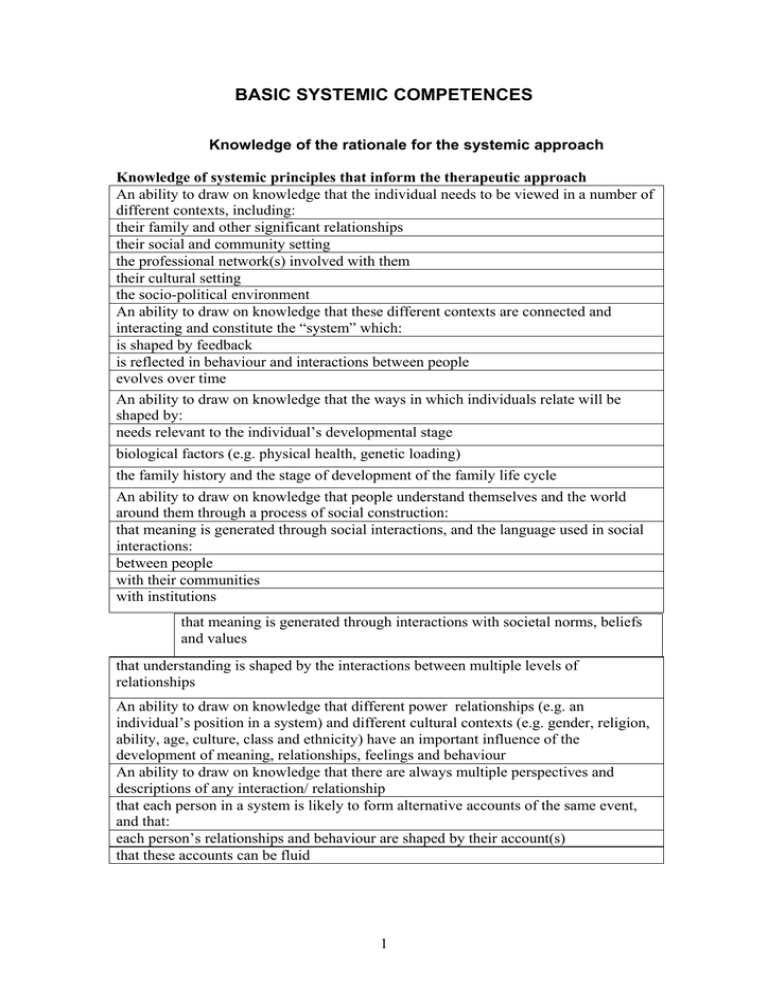
BASIC SYSTEMIC COMPETENCES Knowledge of the rationale for the systemic approach Knowledge of systemic principles that inform the therapeutic approach An ability to draw on knowledge that the individual needs to be viewed in a number of different contexts, including: their family and other significant relationships their social and community setting the professional network(s) involved with them their cultural setting the socio-political environment An ability to draw on knowledge that these different contexts are connected and interacting and constitute the “system” which: is shaped by feedback is reflected in behaviour and interactions between people evolves over time An ability to draw on knowledge that the ways in which individuals relate will be shaped by: needs relevant to the individual’s developmental stage biological factors (e.g. physical health, genetic loading) the family history and the stage of development of the family life cycle An ability to draw on knowledge that people understand themselves and the world around them through a process of social construction: that meaning is generated through social interactions, and the language used in social interactions: between people with their communities with institutions that meaning is generated through interactions with societal norms, beliefs and values that understanding is shaped by the interactions between multiple levels of relationships An ability to draw on knowledge that different power relationships (e.g. an individual’s position in a system) and different cultural contexts (e.g. gender, religion, ability, age, culture, class and ethnicity) have an important influence of the development of meaning, relationships, feelings and behaviour An ability to draw on knowledge that there are always multiple perspectives and descriptions of any interaction/ relationship that each person in a system is likely to form alternative accounts of the same event, and that: each person’s relationships and behaviour are shaped by their account(s) that these accounts can be fluid 1 An ability to draw on knowledge that recursive cycles of feedback (a continuous process of mutual influence) shape each person’s: narratives emotions and feelings behaviour relationships An ability to draw on knowledge that these recursive cycles of feedback (“circularity”) are characteristic of, and influence, all systems (including those of the therapist) Knowledge of systemic theories of psychological problems, resilience and change An ability to draw on knowledge that the systemic model assumes that: psychological problems and emotional distress can only be fully understood by taking into account the systems in which people operate the patterns of relationships within systems may play a significant role in shaping and maintaining psychological problems An ability to draw on knowledge that the systemic model assumes that change in any part of the system has an impact on the rest of the system An ability to draw on knowledge that the systemic model assumes that inherent to all systems is the capacity for change: members of the system have, and can make use of, resources that can promote resilience and maintain change An ability to draw on knowledge that the systemic model assumes that a lack of fit between attempted solutions and the current contexts may lead to the development of psychological problems An ability to draw on knowledge that the systemic model assumes that systems can develop repetitive patterns of interaction which: promote psychological problems maintain psychological problems inhibit positive change Knowledge of the systemic approaches that enable therapeutic change An ability to draw on knowledge that the systemic model assumes: that the presenting problems/ issues organise, and can best be understood within, the pattern of relationships within a system(s) that the development and maintenance of psychological disturbance/ difficulties can be understood within the pattern of relationships within a system(s) that the pattern of relationships within a system will reflect responses to the problem/ difficulties An ability to draw on knowledge of the value and importance of the members of the system as a resource for the promotion and maintenance of change An ability to draw on knowledge of the importance of the therapist (and colleagues) to work collaboratively with the client(s) to develop shared aims and goals and a consequent shared responsibility for promoting therapeutic change An ability to draw on knowledge that the therapist (and colleagues) interact with, and form part of, the system with which they are working An ability to draw on knowledge of the role of historical and trans-generational factors (including family and personal history) in the development and maintenance of 2 psychological disturbance Ability to initiate systemic therapy Ability to initiate contact and undertake a systemic assessment An ability to draw on knowledge of the objectives of a systemic assessment: to understand the context in which the problem developed and the referral emerged to gather information on the initial presenting problem and wider system to understand the resources of the system An ability, prior to meeting with the referred client, to gather further information from the system to determine: whether and how to proceed who to involve when and where to meet An ability to gather and clarify information from relevant members of the system, including information about the decision to seek help and any concerns/dilemmas about the nature of the intervention An ability to use the assessment process to engage with relevant members of the system including, where appropriate, the wider team, referring agencies and support services) An ability to explain the working methods associated with systemic therapy, to demonstrate systemic methods, and to elicit feedback as part of the process of negotiating the use of these techniques An ability to identify (in conjunction with the client(s) and the wider system perceived problem areas and the beliefs concerning them the potential strengths of the client(s) (and the wider system) which may support therapeutic change the solutions that have been tried or have been thought about the achievements in the client(s) life 3 An ability to develop and maintain engagement An ability to engage all members of the system in an empathic, respectful and even handed way by giving each member of the system the opportunity to communicate by showing an interest in all communications An ability to present the rationale for a systemic approach to the client(s) (and the wider system) and to use a variety of developmentally appropriate methods (written and verbal) to aid their understanding of, and continued engagement with, the work An ability to monitor engagement and to identify when issues arise which may threaten engagement (e.g. when members of the system family feel guilty or blamed, or seem to finds the systemic approach puzzling) An ability to ensure that each member of the system understands the purpose of attending An ability to make explicit and value of the unique perspective of each individual on the functioning of the family An ability to help individual members to identify overlapping goals and objectives Ability to develop systemic formulations and help the client(s) identify appropriate goals An ability to develop a formulation(s) of the presenting problem/ difficulty which takes into account: the nature of the presenting problem(s) and/or request for help the place of the problem within the different levels of the system the factors involved in the development and maintenance of the problem(s) the resources of the system and the ways in which these promote or limit change any useful role that the problem has had, and ways in which this could be achieved in other less problematic ways An ability to work collaboratively with clients in order to develop the formulation of the problem(s) and goal(s) for the intervention An ability to share a formulation with clients in order to support their understanding of, and engagement with, the intervention An ability to adapt and revise the formulation(s) and the therapeutic goals on the basis of information which emerges during the course of the intervention Ability to establish the context for a systemic intervention An ability to identify the appropriate individuals/services to participate in the intervention An ability to use relevant social and professional networks to support the intervention An ability to share with the client(s) the developing rationale for the intervention in a transparent, empathic and understanding manner An ability to use information about the client(s) and the wider system to help the clients to develop solutions to identified problems using their own capacity and resources An ability to clarify systemic working practices, including helping the client to 4 understand: the role of the therapist where appropriate, the role of the team and how this will be negotiated the involvement of members of the wider system in the intervention An ability to work collaboratively with the client(s) and the wider system to ensure that: the client(s) and the system in which they are situated have the resources to enable change the clients(s) own capacity and resources are reinforced in developing solutions to the identified problems(s): An ability to engage and involve all members of the system through: developing a good therapeutic alliance with all members of the system ensuring that the individual and developmental needs and abilities of all members of the system are considered ensuring that all members of the system who are present are able and allowed to make a contribution An ability to help the client(s) consider ways in which their problem(s) can be understood with reference to the current and historical pattern of relationships which characterizes the system An ability to adapt systemic interventions to take account of the current context (e.g. the class, gender, ethnicity or sexuality of the client(s)) and the systems from which the clients(s) have come). An ability to ensure that both children and adults are actively involved in the intervention An ability to ensure the active involvement of individuals whose capacity to participate is restricted (e.g. through developmental, sensory or emotional problems) An ability to maintain an even-handed stance to establish an interest in all perspectives offered in the session by: eliciting different views from all members of the system (including where appropriate those not present) using, where necessary, a range of techniques (for example, temporarily taking the role of another in the system) Ability to maintain and develop a systemic approach Ability to work in a reflexive manner An ability for the therapist to work in a reflexive manner by : using client feedback and discussion with colleagues to reflect on their own values, prejudices, thoughts and emotions and to consider the effects of these on the therapeutic process using knowledge gained from the impact of the work on themselves to modify their behaviour and interventions making the effects of the therapy on themselves explicit to the client(s) in ways that promote therapeutic change using knowledge gained from the impact of the work on themselves to support and maintain engagement throughout the course of the intervention Ability to use monitoring to promote change 5 An ability to identify changing patterns of beliefs, emotions and behaviours in the client(s) (e.g. the location of problems within the system or attributions of blame) an ability to make use of these observations to select the most appropriate interventions to promote change An ability to consider (where appropriate with colleagues) the outcome of a session in order to plan future sessions An ability to use outcome measures to monitor progress in treatment an ability to discuss these measures with the client(s) an ability for the therapist to use measures to reflect on their own work and that of the service Ability to facilitate communication across the system An ability to use written and verbal communication with the client(s) and the wider system (as appropriate) as part of the systemic approach, taking into account: the age and ability of recipients the likely understandings and priorities of the ‘audience’ (e.g. GPs, schools, police, etc) the impact on different levels of the system Ability to manage endings An ability to agree with the clients(s) an appropriate end point for the intervention An ability to review changes that occurred during the intervention with the client(s) and with colleagues, in order to facilitate: the maintenance of positive change the development of relapse prevention strategies An ability to help client(s) discuss their views of the end of intervention, the need for follow up or further support, and ways in which the outcomes of the intervention will be communicated with the wider system An ability to notice when client(s) find the process of ending is more difficult, and to help them identify what resources they can draw on to manage this An ability to help clients think about how they can maintain therapeutic gains by engaging the resources of significant members of their network An ability to reflect on the impact on the therapist themselves of the ending of the intervention and on any implications for future practice Back to Competences Map 6
